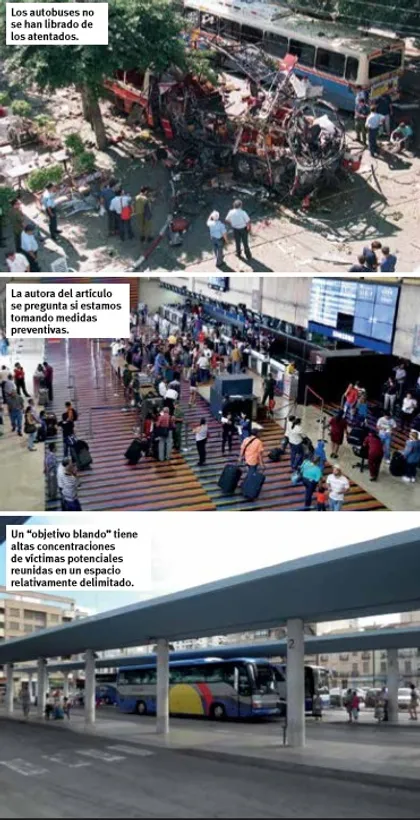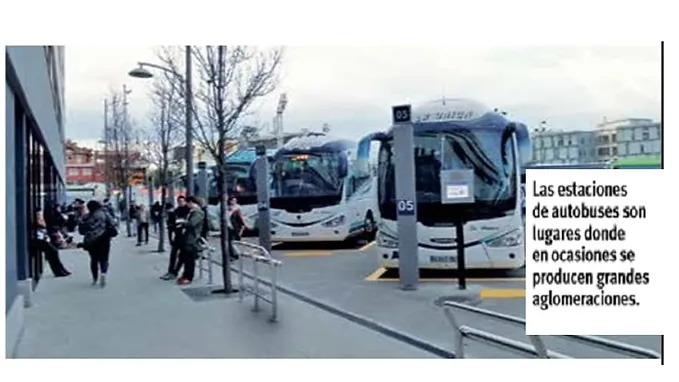Transportation, security and jihadism
20/11/2017
Share
The series of articles that I have written for this magazine touch on very different topics, all of them related to passenger transportation and always from the point of view of law; Yes, in a broad sense, having referred to both the company’s responsibility in cases of driving under the influence of drugs or alcohol, as well as the collaborative economy, unfair competition and contests and reckless terminations. In any case, the aim has been to provide the vision of law to common problems and situations in your daily work, always focusing on your responsibility and your ability to look forward, change things and adapt a sector deeply stagnant in the ways of working of the past to a future that is already present.
This article also appeals to responsibility; speaks of conscience and responsibility; It speaks of fear and security. And he talks about law. And he talks about terrorism. We are not saying anything that you do not already know: jihadism has spread terror in train stations -vid Atocha-, subways -Brussels, London, Paris-, and has used transport vehicles: vans -London and Las Ramblas in Barcelona- , trucks -Berlin and Nice-. You may think that “fortunately” the stations and means of land transportation for travelers “have been spared,” but that is not the case. Another thing is that such incidents are much less known.
We are objective
The latest issue of Inspire, al-Qaeda’s magazine, published last August, directly threatens transportation. Although the article focuses on rail transport, both air and sea transport and road transport are also emerging as potential objectives. All of them constitute the network on which the exchange of goods and the free movement of people is based, both key elements in the process of globalization, the main instrument of control of Western power – according to al-Qaeda – over the Islamic community. Therefore, by attacking and breaking these communication flows, global jihadism attacks the enemy par excellence, the established power of the West. These types of objectives are nothing new in the framework of international terrorism, not just jihadist. Do you remember the Achille Lauro, the passenger ship hijacked in 1985 by a group of Palestinians linked to the terrorist organization Abu Nidal? And the sinking of the US destroyer USS Cole by al-Qaeda? Planes have suffered a multitude of incidents, from high-profile hijackings such as the Air France flight that gave rise to the ‘Entebbe’ event in 1976, attacks on airport facilities such as those in Rome (1985), Brussels or Istanbul (2016), or even detonations of airplanes in mid-flight such as SwissAir in 1970. To a lesser extent, and much more in contemporary times, this can also be said of the railway and metro network: 11M in Madrid, which affected the commuter train network, or the attacks on the London Underground in 2005 and 2017 and Brussels in 2016. In this sense, the best off seem to have been the members of the road transport sector, undoubtedly due to the fragmentation and flexibility of the routes that this transport go on.
But, far from being an unknown target for terrorism, road transport, especially for passengers, has been a recurring objective in the last two decades, without the blows suffered having translated into lessons learned and consequent security measures. Tel Aviv and Jerusalem have been some of the cities that have seen their urban and intercity buses turn into balls of fire and, literally, charred meat. It is true that it has not happened in Europe. Still.

Security measures
The target of the latest wave of jihadist terrorism are the so-called “soft targets”, that is, those with high concentrations of potential victims confined in a relatively delimited space and low security measures. We can talk about the Bataclan Room, but also about any regular line or discretionary passenger transportation. Let’s think, from the point of view of a traveler, when was the last time you had your bag searched when taking a bus/coach? And from the point of view of a road passenger transport businessman, what security measures do you have planned to protect passengers? Let’s think for a moment about the effect of an explosion in the confined space of a bus. And let’s think about the effect of the same explosion while the bus picks up new passengers at one of the large bus stations in our country. Taking into account that road transport is, due to its characteristics, within this broad definition of soft objectives, and that in this case it maximizes the potential number of victims, are we taking appropriate security measures? What’s more, are we taking any? In a very simple way, passenger transport can be defined as that in which the carrier undertakes to transport people from one place to another in exchange for a price. And the carrier’s obligations include transporting the traveler, guaranteeing their safety and carrying out the trip without any damage to people or transported effects. In the land transport of passengers, this responsibility moves – in accordance with articles 128, 148 and 131 of the Consolidated Text of the Law on the Defense of Consumers and Users, of November 16, 2007 – towards a form of insurance, articulated decades ago. through the SOV – Mandatory Travel Insurance, regulated in Royal Decree 1575/1989, of December 22 -, also compatible, according to constant Jurisprudence, with compensation for real damage suffered based on the non-contractual liability of article 1,902 of the Civil Code .
Compensations
Now, cases of terrorism are generally excluded from the SOV and are considered extraordinary risks covered by the Insurance Compensation Consortium, in accordance with the provisions of its regulatory standard -Royal Decree 300/2004, of February 20-. However, the right to compensation does not accrue absolutely, but rather certain requirements must be met, among which, as far as this article is concerned, the most important ones are having a life or personal accident insurance policy/s in force. and be outside the waiting period. What if that is not the case due to lack of insurance, or even due to not being up to date with the payment of the fee? What if the damage is caused to any person or property that is at the scene of the accident but is not a traveler and lacks any type of personal insurance? In these cases, who would assume the payment of compensation? As we have already said before, jihadism is targeting means of passenger transport, among which, logically, are land vehicles, and yet not the slightest security measure is adopted… are you convinced that it should not be adopted? Will the company face such compensation for negligence, for such an absolute lack of foresight and security despite the direct terrorist threat?
At this point, is it Martian to urge companies to adopt safety measures for their own facilities, vehicles and passengers? We imagine that the first thing you are going to think about is the high costs, especially taking into account that the risk is remote and, consequently, that something unquestionably terrible is going to happen to none of you or your companies; It is relegated to think about the responsibility that falls on you as carriers – you already have enough with ordinary risks without thinking about something like that -, and not even remotely think about the quality of your services… However, the application of basic security measures does not It is both an investment and an attempt to avoid a much larger loss. Would the shared investment with other transport companies be so high from installing metal detection arches at the access doors to the docks along with a security guard checking hand luggage? What if we compare it to the loss of a vehicle, possibly dozens of human lives and even damage to infrastructure, in addition to having to, in certain cases, deal with the corresponding compensation?

A vulnerable sector
Likewise, in the case of discretionary transport, brief vulnerability studies could still be carried out on the specific group of travelers, their profile determined, and, where appropriate, protection service contracted – with a properly trained security operator, of course – during the route and during the time on the ground. This point can be easily understood with an example: suppose a trip of wealthy American businessmen who want to invest in our country, and who during their free time and even business, travel through it from start to finish for a month. For longer distances they will use another means of transportation, but for shorter ones – such as suckling pig tasting in Segovia, visits to Montserrat or El Escorial – they have decided to hire occasional coach transport. Logically, this type of travelers presents more vulnerabilities due to their profile – that is, more risks – than, for example and with all due respect, the Association of Housewives of the parish of San Genaro de Albacete on a trip to the Sanctuary of Fátima. It would make the service more expensive, yes, but it would also mean a decisive commitment to quality and safety that would benefit both customers and the carrier itself. Certainly, it is not possible to apply the same type of security measures to regular, discretionary or urban transport, but there are some basic minimums suitable for any road passenger transport. Would the training cost of preparing your drivers in basic techniques for detecting suspicious behavior inside their vehicle and providing primary assistance to victims be so high? Something like this could prevent attacks and could prevent the number of victims. Vulnerabilities exist and today, when the risk is still limited, we still have time to take measures to minimize them, to the best of our ability, of course. All of us, at one time or another, are users of collective passenger transport, or pass through the street at the same time as a bus, so we are all potentially victims of a lack of security measures. We are supposed to have the brain to do something like think? and not mere decoration – here I would use an emoticon to release a little tension, because for the majority it is not even useful for that.
I already know that we are “giving you the day” by putting our finger on a tremendously hard and sensitive issue: we are aware of this and it is a responsibility that we assume. And so, what is the responsibility of all of us, citizens, when it comes to preventing to save lives? And what is yours as businessmen in a sector directly identified as a terrorist target?

